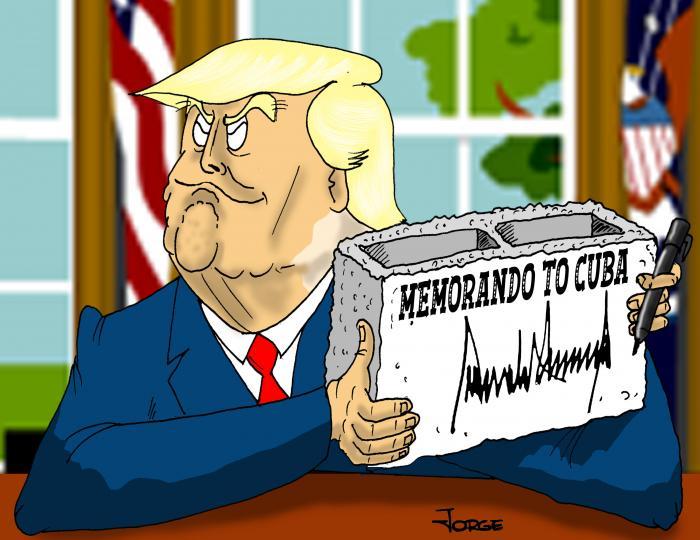
One of the most despicable aspects of the criminal policy of blockade against Cuba is associated with the violation of national sovereignty.
The impact of the blockade not only has a terrible material effect, which has been documented in detail year after year by the island's Foreign Ministry, but also because it disregards the concept of sovereignty, which is the very basis of international relations and peaceful coexistence among nations.
Precisely, the disregard for the sovereignty of the Republic of Cuba explains, on the other hand, the permanent solidarity of the peoples, as well as the sustained support of numerous governments in their condemnation of the blockade, expressed in international votes at different events, such as the massive annual support for the Resolution that the Secretary-General of the United Nations (UN) presents to the General Assembly.
It is useful to emphasize what the documents and the international consensus itself understand as respect for the sovereignty of countries. Considered a fundamental principle, it establishes, among other things, political independence, legal equality of states, non-intervention, and the most scrupulous respect for self-determination and non-interference in the internal affairs of each country.
Respect for independence is based on key documents of the UN system, such as its founding Charter of 1945, the International Covenant on Civil and Political Rights of 1966, the Vienna Convention on the Law of Treaties of 1969, and the Declaration on Principles of International Law of 1970, to name just a few of the most comprehensive references.
Another related issue, which confronts the US aggression against Cuba, has to do with the rampant illegality of applying unilateral sanctions against Cuba. Established jurisprudence on this matter clearly states that only the UN Security Council can employ this procedure, according to Article 8th of the founding Charter.
This historical and legal background is perfectly relevant to Presidential National Security Memorandum NSP/N-5, which the US president signed on June 30.
As a political platform, as Cuban Deputy Foreign Minister Carlos Fernández de Cossío rightly pointed out, the document is a stark example, without pretense or opacity, of a violation of Cuban sovereignty.
The memorandum clearly shows the intention to interfere in Cuba's internal affairs. It opines with excessive arrogance on the political system, legal norms, and even the Cuban business system, establishing blacklists of Cuban entities with which third countries cannot interact, reaffirming in passing the extraterritoriality of both Memorandum NSP/N-5 and the internationally rejected Helms-Burton Act of 1996, which is extensively referenced in case there was any doubt.
With threatening language, NSP/N-5 is based on the traditional carrot-and-stick policy, insisting, like the aforementioned Helms-Burton Act, that relations between Cuba and the US will only improve when there is a government on the island that is to Washington's liking, and a US intervener appointed by the White House is first established.
Based on this brief inventory of the NSP/N-5's mistakes, it is clear that its enforcement on the island is absolutely unconstitutional.
Damaged from the outset, the Memorandum ends up being a pamphlet that responds to the petty and narrow interests of a small mafia group in South Florida, dangerous because of their current and probably ephemeral power, but without any representation of the Cuban people, including the majority of the diaspora, whom these scoundrels have betrayed by bowing to the anti-immigrant policy of the current administration, as well as by generating and proposing a total break with their relatives in Cuba.
Another sordid aspect of the NSP/N-5 has to do with the narrative on which it bases its attempts to justify or legitimize its aggressive stance.
It is extraordinary how closely this coincides with the daily narrative that can be read in digital media or in the content promoted by certain digital mercenaries, the so-called counterrevolutionary cluster.
Clearly, the original source of the story is the bureaucracy of the State Department or the US special services, so the aforementioned cluster merely amplifies and acts as a sounding board for the former.
Carefully crafted opinion matrices on issues such as alleged political prisoners, lack of freedom of expression or religion, or the manipulation of issues related to the country's socioeconomic situation, often seasoned with delusional falsehoods, show this close subordination, which has been well documented by experts and declassified materials on the CIA's "exploits" against Cuba.
Hence, another conclusion, regarding the central issue of Cuban sovereignty, is the use of paid mercenaries by the aggressor, united in their efforts to establish a kind of neocolony 2.0 in the middle of the Caribbean Sea, at the very entrance to the Gulf of Mexico, not of America, as the White House tenant capriciously renamed it.
On another note, the NSP/N-5 certainly contradicts what Trump himself, the signatory of the Memorandum, said during his recent visit to Saudi Arabia, where he expressed his opposition to any policy of "regime change," as they call the removal of a defiant government, which is precisely what the Memorandum clearly promotes.
The NSP/N-5 can already be used in schools as an example of undisguised interference, maliciously ambiguous to allow the "Mayamera" clique, led by Secretary Rubio, to expand the aggression and blockade, protected by a monstrosity of supposed legal solvency, without any international legal basis.
This story confirms, once again, that the antagonism between socialism and imperialism goes beyond the confrontation between two opposing systems; in the Cuban case, the survival of the former is the only way to preserve national independence and the inalienable right of Cubans to determine their way of life.
They may arbitrarily and cruelly apply Memorandum NSP/N-5, others may come in the future, but the Revolution in Cuba will remain.








